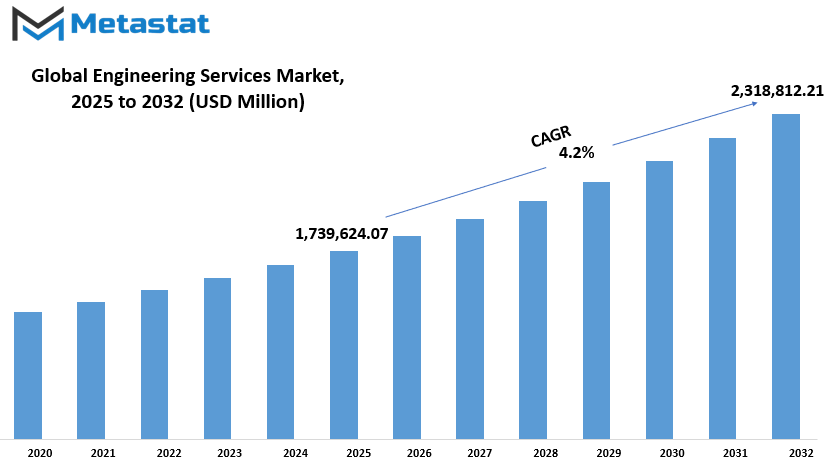MARKET OVERVIEW
The global engineering services market is a critical column of the infrastructure and industrial construction business, assisting in the design, planning, execution, and upkeep of complex projects globally. While much has been said on its current applications in construction, energy, transport, and manufacturing, what it holds for the future is far greater than its applications today. As nascent capabilities emerge, the sector will be transformed by a revolution that reimagines business, government, and society's interaction with engineering problems.
In addition to its traditional roles, the Global Engineering Services industry will increasingly become embedded within digital ecosystems. With the integration of digital twins, advanced simulation tools, and analytics, companies will be able to visualize and simulate solutions long before they take physical form. This change will not only reduce errors and utilize resources in the best possible manner but also shorten the lag between conception and action. These capabilities of technology will encourage a faster and iterative style, especially industrial design and infrastructure.
One of the most significant changes in the global engineering services market will be how companies approach sustainability—not as a matter of compliance but as an inherent aspect of every project. Engineering consultancies will begin to play a more advisory function, advising clients to adopt methods and materials that further long-term environmental and operational goals. Engineers won't be alone anymore; they will be accompanied by data scientists, environmental advisors, and policy experts to collaborate on developing wiser and cleaner solutions.
Geographical distance, too, will become less relevant as remote work and cloud platforms evolve. Projects that once required physical on-site visits and months of preparation will soon be controlled from different continents in real-time. This shift will introduce new issues surrounding cybersecurity, data ownership, and compliance, all of which the global engineering services market will need to confront head-on. Companies will spend money on more secure and robust digital infrastructures to protect intellectual property and sensitive project data.
Another order of change will come through the use of artificial intelligence and machine learning. These will not only enhance productivity but also transform the nature of decision-making. Automated optimization and risk analysis programs will assist engineers in delivering more advanced results, especially in high-risk ventures like urban or national infrastructure renewal. As AI becomes more embedded in engineering activities, the field of human judgment will move towards direction, ethics, and innovation.
The competitive forces in the Global Engineering Services industry will also shift. New entrants will bring niche expertise, and established players will resort to mergers and acquisitions to stay relevant in a data world. Talent demands will force organizations to seek not only engineers with technical expertise but also professionals who can link engineering with strategy, technology, and sustainability.
In the future, the global engineering services market will not just respond to the needs of industries it will chart the course of how industries will be done. It will emerge as an engine of transformation, where technology, teamwork, and sustainability meet to redefine the boundaries of what's possible.
Global engineering services market is estimated to reach $2,318,812.21 Million by 2032; growing at a CAGR of 4.2% from 2025 to 2032.

GROWTH FACTORS
The demand for global engineering services market is rising gradually as a result of strong demand for infrastructure development and enhanced industrial automation requirements. Countries worldwide are investing in the construction of better transport systems, advanced infrastructure, and smart cities, which creates additional demand for specialized engineering support. However, companies are looking for ways to increase their efficiency in operations, and automation is a part of that activity. Engineering services are thus in great demand for developing, testing, and implementing advanced systems and machines.
Offshore product design and development is yet another driving factor that is specifically contributing to the growth of the market. Firms are mostly outsourcing these activities to expert engineering firms. This allows them to reduce costs, expedite time to market, and focus on their core competencies. It also allows them to access a wider pool of talent and advanced tools that they may not have within their companies. Outsourcing has proven to be a smart step for firms wanting to stay competitive while reducing costs and improving the quality of their products.
Despite these strong growth drivers, the market is not without some difficulties. The greatest challenge is the shortage of qualified professionals in certain fields of engineering. With the rapid evolution of technology, demand for qualified professionals who specialize in robotics, software-based systems, and sustainable design is on the increase. The supply, however, is not responding to the demand for such skilled professional workers. Shortages can shorten project delivery timelines and the quality of outcomes.
There is also the issue of overreliance on project-based revenues. Engineering firms are likely to be involved in time-bound and tailored contracts with individual client specifications. While the model offers flexibility, it also generates income uncertainty and difficulties in long-term planning. Fluctuations in client budgets and shifting business needs can impact present and future projects.
In the coming times, there are encouraging opportunities for growth. The growing use of computer engineering tools, artificial intelligence, and simulation technology will radically alter the way services are being offered. These technologies allow one to design faster, test more accurately, and reduce the risk of errors, which directly translates to value being added to customers. The companies that adapt and integrate these technologies into their services will be industry leaders and see greater demand in the next couple of years.
MARKET SEGMENTATION
By Engineering Disciplines
The global engineering services market holds the central position to define the development and growth of contemporary industries. It represents a broad spectrum of specialized areas that facilitate companies to design, plan, and develop projects efficiently. Engineering Disciplines is among the largest sectors of this industry, which comprises Civil, Mechanical, Electrical, Piping, and Structural engineering. Among these, Civil Engineering dominates the market at $533,455.72 million. This industry underpins crucial infrastructure projects like roads, bridges, buildings, and water works that keep the city functioning and linked. It's the pillar of a great deal of engineering activity and a high-value industry worldwide.
Mechanical Engineering is also a huge component of this industry, with machines, equipment, and mechanical systems that boost performance in everything from factories to cars. These engineers collaborate hand-in-hand with industries requiring higher energy efficiency and dependable machinery. Electrical Engineering is also crucial, particularly in the current era where electricity drives almost everything we do. This field entails designing electrical systems for buildings, equipment, and power distribution. It also advantages renewable energy systems, which are now applied in most nations.
Piping Engineering is a critical operation in oil and gas, chemical facilities, and water treatment facilities. These engineers work on designing pipe systems for the conveyance of fluids and gases efficiently and safely. Their role is critical in maintaining systems under pressure without failure. Structural engineering is concerned with ensuring buildings and other constructions can sustain loads and weather conditions. All the referred to disciplines provide unique services but are also interrelated with one another and create a strong network that contributes to project success from inception through project delivery. With increasing industries and evolving technologies, the importance of these fields of engineering will continue to rise, determining the future in modest but effective ways.
By Delivery Model
The global engineering services market is rising steadily as a result of rising demands for specialist engineering services in industries including construction, automobile, aerospace, and manufacturing. Firms from around the world seek effective methods to deal with issues of development, design, and operations, leading them to outsource such talent. Business organizations are in a position to increase efficiency, minimize costs, and introduce innovation into business processes without the need of establishing tedious in-house teams with the help of these services. Due to this, engineering service providers are becoming key collaborators in the achievement of project objectives and resolving technical challenges. Depending on the delivery model, the global engineering services market can be divided into Offshore and Onsite.
Offshore is work performed remotely, usually in low-cost labour economies. This delivery model provides companies with a cost-saving measure and access to a large talent pool without the establishment of local offices. It also provides for around-the-clock working schedules since teams across different time zones can work on projects without interruption. Conversely, Onsite services entail engineers working on the client's premises. This method is convenient where projects demand continuous monitoring, direct interaction, or where sensitive information is concerned that cannot be easily communicated online. Both models of delivery have varying advantages, and organizations choose one according to their needs, cost, and the extent of complexity required to perform the task.
As technology continues to develop, the role of engineering services is on the rise. Companies now no longer just seek support for basic design or maintenance activities—today, they now outsource research, system integration, automation, and green solutions to engineering groups. This has opened up opportunities for service providers to offer value-based solutions to help their clients remain competitive. Whether it's creating intelligent infrastructure or increasing the product life cycles, engineering services are becoming integral to business models.
The growth is also urging the service providers to invest in skilled personnel, advanced tools, and quality systems. These investments see to it that they maintain top-notch standards and meet the expectations of international customers. With increasing interdependence among companies and reliance on more online platforms, there will be even greater demand for strong and reliable engineering support. Companies that implement and make the best choice between Offshore and Onsite models will be adequately positioned to prosper in a competitive business world. This balanced model of delivery models, coupled with the call for innovation and efficiency, will continue to shape the future of engineering services worldwide.
By Services
The global engineering services market is growing slowly as businesses across all sectors continue to seek better ways of designing, maintaining, and optimizing their processes. The industry offers various services, which help companies stay competitive by using expert support and technical expertise. Among the most important categories of these services are Product Engineering, Process Engineering, Automation Related Services, and Asset Management Related Services. Each of them has a particular function in assisting organizations achieve their technical and operational objectives.
Product Engineering is one of the core areas, revolving around designing and developing new products or improving existing ones. The service takes care of the entire product development life cycle, starting from the idea and design stage, moving through testing, and finishing with product release. Organizations benefit from this by being able to make available enhanced and optimized products to the market and hence maximizing customer satisfaction and overall income.
Process Engineering, nonetheless, is all about making production or manufacturing better. This process helps companies get rid of waste, improve quality, and make operations less expensive. It takes into account the way in which processes are designed and works on making them run better. It not only saves money, but it also provides consistent results.
Automation Related Services are growing in popularity as companies aim to speed up and make their activities more precise. Automation services involve the use of technology to reduce human effort and enhance speed. Automation also lessens the chances of errors and aids in greater control and monitoring. Most industries, especially those involving manufacturing and energy, are accepting automation in order to be competitive.
Asset Management Related Services are designed to make businesses use their physical assets to the fullest. This includes equipment, machinery, and other infrastructure. These services help in tracking the health of assets, scheduling maintenance, and avoiding breakdowns. This has a cumulative impact of saving money and prolonging the life of the equipment.
All these services are building the foundation of the global engineering services market. As businesses keep looking for smart ways of doing business, the market will keep growing. All the services are helping in some manner to help businesses become more efficient, cost-saving, and ahead of impending challenges. With all of this steady demand, the engineering services market will keep being a core part of business strategy across most industries.
By Industries
The global engineering services market serves a broad base of industries via designing, developing, and maintaining different technical projects. The services are crucial to sectors that depend on high-order solutions in order to become more efficient, meet safety standards, and accommodate increasing demands. The industry is organized through several big sectors and their related needs and demands.
Aerospace and Defense is a very large segment in this industry. This segment frequently needs the services of professional engineers for designing aircraft, maintenance systems, and sophisticated defense equipment. These services ensure performance and safety in hostile environments. Automotive also relies on engineering services for enhancing vehicle performance, fuel efficiency, and safety features. With increasing demand for electric vehicles, there is an increasing requirement for battery design, electric motor design, and infrastructure support.
The Chemical and Petrochemical industry also gains from the services of engineering. It includes the installation of chemical plants, process design, and safety checks to handle complex material. The field demands careful planning and continuous updation, and that is precisely what the engineering departments offer. The next significant category is Electric Power Generation, for which engineers provide projects for alternate sources of power, fossil plants, and power supply systems. Their efforts provide a smooth and secure amount of electricity.
Municipal Utility Projects involve planning and enlargement of public works such as water, waste treatment, and local generation and distribution. The projects are engineering-based to produce solutions to long-term population growth needs and changing environmental conditions. In the Mining industry, engineering services are needed to design effective ways of mining, waste disposal, and production gains in open-pit and subterranean operations.
The Oil and Gas industry has been irrevocably linked with engineering services since the technological complexities of extraction, transport, and refining. Engineers assist in mitigating risk and optimizing operations in challenging and hostile environments. Pharmaceuticals is another major sector where engineers assist in facility design, production systems, and controls to ensure high health standards. Transport relies on engineering services too, as much as road development, railway infrastructure, and airport upgrades are concerned.
Other industries that make use of engineering services include construction, food processing, and electronics. Each of them has its own specific needs, but they all depend on such services to advance projects effectively, and safely. As technology continues to advance, the position of engineering services will only be more demanding in all these fields.
|
Forecast Period |
2025-2032 |
|
Market Size in 2025 |
$1,739,624.07 million |
|
Market Size by 2032 |
$2,318,812.21 Million |
|
Growth Rate from 2025 to 2032 |
4.2% |
|
Base Year |
2024 |
|
Regions Covered |
North America, Europe, Asia-Pacific, South America, Middle East & Africa |
REGIONAL ANALYSIS
The global engineering services market is diversified across the world and regions play a significant role in its development and growth. The market is geographically segmented into North America, Europe, Asia-Pacific, South America, and the Middle East & Africa. North America comprises the United States, Canada, and Mexico, out of which the U.S. is the prime contributor based on its robust industrial sector and ongoing technological developments. Canada and Mexico also provide consistent contributions, fueled by the increasing need for infrastructure development and digitization across sectors.
In Europe, the UK, Germany, France, and Italy are significant contributors. These nations have deep-rooted engineering heritage, and numerous international companies have operations or headquarters within them. Government support and public-private partnerships favor the market in Europe with investments in infrastructure, renewable energy, and smart cities. The rest of Europe contributes value, albeit at a moderate level, often driven by regional policy and economic considerations.
The Asia-Pacific region is growing rapidly. India, China, Japan, and South Korea are leading the way, due to their sizeable populations, rapidly growing economies, and growing investments in industrial and infrastructure projects. India and China, in fact, are growing their engineering capabilities across sectors such as construction, transportation, and manufacturing. Japan and South Korea, with their reputation for innovation, are investing in automation and cutting-edge technologies to drive productivity. The rest of the Asia-Pacific region keeps growing steadily as smaller economies also invest in development projects.
Another critical region in this market is South America. Its leading nations include Brazil and Argentina, with Brazil frequently leading in terms of its size and economics. Engineering services in this place are primarily facilitated by the desire for infrastructure building, particularly for transportation, energy, and city planning. The remainder of South America also finds its contribution with regional cooperation and investment projects increasing momentum.
Middle East & Africa segment consists of GCC Countries, Egypt, South Africa, and others. GCC Countries are investing significantly in smart cities, oil and gas ventures, and sustainable infrastructure, which supports increasing demand for engineering services. Egypt and South Africa also exhibit favorable growth, as both countries concentrate on developing their infrastructure and bringing in foreign investment. The remainder of the region contributes to the market with incremental but favorable advancement in engineering-oriented sectors.
Each of these areas contributes to the overall development of the Engineering Services market, influenced by economic conditions, government incentives, and continuing industrial requirements.

COMPETITIVE PLAYERS
The global engineering services market is a vital force behind the development and infrastructural formation of all over the world. It involves a broad portfolio of services which bring projects to reality, ranging from design and planning to construction and maintenance. The engineering services are applied across various industries such as transportation, energy, water, and manufacturing. With growing cities and technological advancements, the need for quality engineering services keeps on rising. This increasing demand results in the expansion of firms offering these services, hence establishing intense competition within the market.
Some of the major players in the Engineering Services market are AECOM Engineering Company, Bechtel Corporation, Kiewit Corporation, WSP Global Inc, STRABAG SE, NV Global, Inc, Barton Malow, Gilbane Building Company, Jones Lang LaSalle Incorporated, Balfour Beatty Inc, Brasfield & Gorrie LLC, and RMF Engineering Inc. These firms provide a combination of services that assist in the completion of large and small projects. They are renowned for their experience and have been involved in numerous high-profile projects worldwide. Their success is often subject to a combination of experience, technology, human resources, and the capacity to control costs and timelines.
Most governments and private organizations depend on engineering companies to maintain public facilities such as roads, bridges, airports, and energy systems. With increased focus on sustainability, most companies now provide solutions centered on minimizing damage to the environment and maximizing energy efficiency. Thus, engineering services are not only about constructing something new but also enhancing what is already there in smarter ways.
The industry itself also has to contend with its own set of challenges, like shifting policies, increasing material costs, and needing to evolve when it comes to new technology. Businesses that manage to remain adaptive and accommodate today's needs stand a better chance of succeeding. This means making use of modern technology like data analysis and 3D modeling, which ensure faster project execution and less error.
Overall, the global engineering services market is likely to continue growing with urban growth, green issues, and the necessity for intelligent infrastructure. The industry leaders in this sector continue to raise the bar by posting strong performances and embracing new challenges. As greater emphasis is put on innovation and sustainability, engineering services will remain a core part of creating the future of construction and development.
Engineering Services Market Key Segments:
By Engineering Disciplines
- Civil
- Mechanical
- Electrical
- Piping and Structural
By Delivery Model
- Offshore
- Onsite
By Services
- Product Engineering
- Process Engineering
- Automation Related Services
- Asset Management Related Services
By Industries
- Aerospace and Defense
- Automotive
- Chemical and Petrochemical
- Electric Power Generation
- Municipal Utility Projects
- Mining
- Oil and Gas
- Pharmaceuticals
- Transportation
- Others
Key Global Engineering Services Industry Players
- AECOM Engineering company
- Bechtel Corporation
- Kiewit Corporation
- WSP Global Inc
- STRABAG SE
- NV Global, Inc
- Barton Malow
- Gilbane Building Company
- Jones Lang LaSalle Incorporated
- Balfour Beatty Inc
- Brasfield & Gorrie LLC
- RMF Engineering Inc
WHAT REPORT PROVIDES
- Full in-depth analysis of the parent Industry
- Important changes in market and its dynamics
- Segmentation details of the market
- Former, on-going, and projected market analysis in terms of volume and value
- Assessment of niche industry developments
- Market share analysis
- Key strategies of major players
- Emerging segments and regional growth potential








 US: +1 3023308252
US: +1 3023308252






